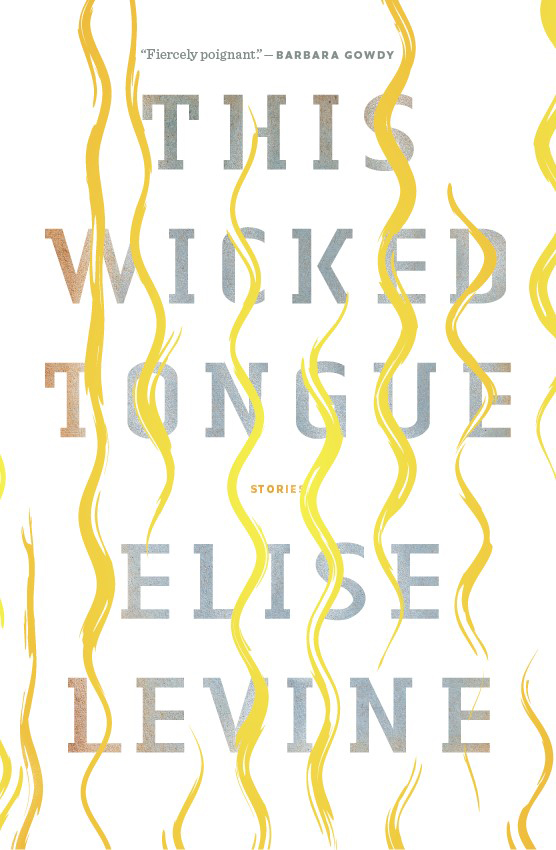Steven W. Beattie Reviews Elise Levine's This Wicked Tongue
Elise Levine. This Wicked Tongue. Biblioasis. $19.95. 172 pp., ISBN: 9781771962797
There are writers who signal their stylistic intentions and ambitions right up front in their work: Canadian-born expat Elise Levine is in this camp. The reader need proceed no farther than the opening sentence in “Money’s Honey,” the first story in Levine’s second collection, before being put on notice that what follows should not be expected to cleave to the comfortable boundaries of mimetic naturalism: “If I moved my head, the air turned dark and blurred my breathing and I felt sick, bad sick.”
It’s the verb “blurred” that does it, as much as anything else. Writers of a more literal or conventional bent would naturally pair the word with vision; by deploying it to describe breath, Levine at once upends obvious expectations and proffers a metaphor that is as appropriate as it is startling. Significantly, in the context, “blurred” is also piercingly specific, indicative of a very particular kind of malaise. That the word is resonant with a sentence that finds itself and its unidentified first-person narrator in motion is also deliberate: paired with the dark and the movement of the character’s head producing a kind of “bad” sickness, it suggests procession through surroundings that are immediately inimical and full of threat.
This single-sentence paragraph is followed in quick succession by a series of similarly glancing, elliptical paragraphs built of short, declarative sentences that withhold as much information as they provide. The second paragraph confirms what we might already have intuited: the scene is a moving car, travelling through the stultifying July heat in the middle of a desert. There are two people in the car: a man, who is driving, and our still-unnamed narrator.
It transpires that the two are headed west; the woman has set out from Ontario toward her ultimate destination of Los Angeles and is in the company of a Bible-thumping driver. The two are currently passing through the city of Indio, California. All of this comes clear via a kind of sideways narration that forces the reader to remain constantly alert to the hints and suggestions Levine infuses into her story. The man’s questionable adherence to the tenets of Biblical morality, for instance, is revealed by an almost throwaway observation the narrator makes while watching her skeletal companion pack away parts of her meal, having already devoured his own: “And still his bones left bruises on me each time we joined our hearts together.” For a man who “belongs to some church” and has an affinity for preaching about the Lord delivering Daniel from the jaws of the lion, the twinned transgressions of gluttony and lust in the woman’s assertion prove particularly barbed.
The moment also testifies to another characteristic of Levine’s fiction: her subversive humour. It’s difficult not to smile ruefully at the euphemism inherent in the two itinerant travel companions bumping against one another as they join their “hearts together.” Such moments appear throughout the collection, always provoking surprise and admiration at their uneasy honesty combined with a frank fittingness. When the 20-year-old pastoral student in “The Riddles of Aramaic” thinks back on her parents, she reflects that they always lavished more attention and affection on their dog than on any human, and wonders what prompted this, “[w]hen it’s not as if he could peel them a grape or get away with murder.” That story, one of the book’s most merciless entries, ends with a reckoning that is as unexpected as it is disturbing.
Levine published her first collection, the similarly challenging Driving Men Mad, in 1995; since then she has taken a detour into the land of the novel, with Requests and Dedications appearing in 2003 and Blue Field in 2016. But This Wicked Tongue reinforces the notion that short fiction is the author’s true métier. The new collection extends and deepens the approach adopted in her debut, alternating short pieces of one or two pages with longer, more contemplative works. Levine’s preferred method is to fracture her stories by cutting up perspective or chronology over multiple short sections within a specific piece. More essentially, she works to splinter her very language and present the reader with linguistic shards that may or may not be reassembled to create a complete, coherent image.
Though she is fully capable of forging straightforward, recognizable narratives – most evidently in the paired pieces “The Association” and “As Such” – Levine more often forces her readers to slow down, to reread, and to actively engage in the stories as a means of retrieving some semblance of meaning or context. When she is at her most outré, as in the concluding dystopia, “Alice in the Field,” or the fable-like “Public Storage Available Now,” it is tempting to assume that any conventional meaning or signification may remain ever elusive, just out of reach of a reader’s comprehension. In such cases, it is better just to sit back and let the language, distilled to its most pristine, wash over you with the force and effect of poetry. Levine’s prose is musical, and frequently melodic, if one has the patience and dedication to listen carefully enough.
Steven W. Beattie is the review editor at Quill & Quire magazine. He lives in Toronto.


